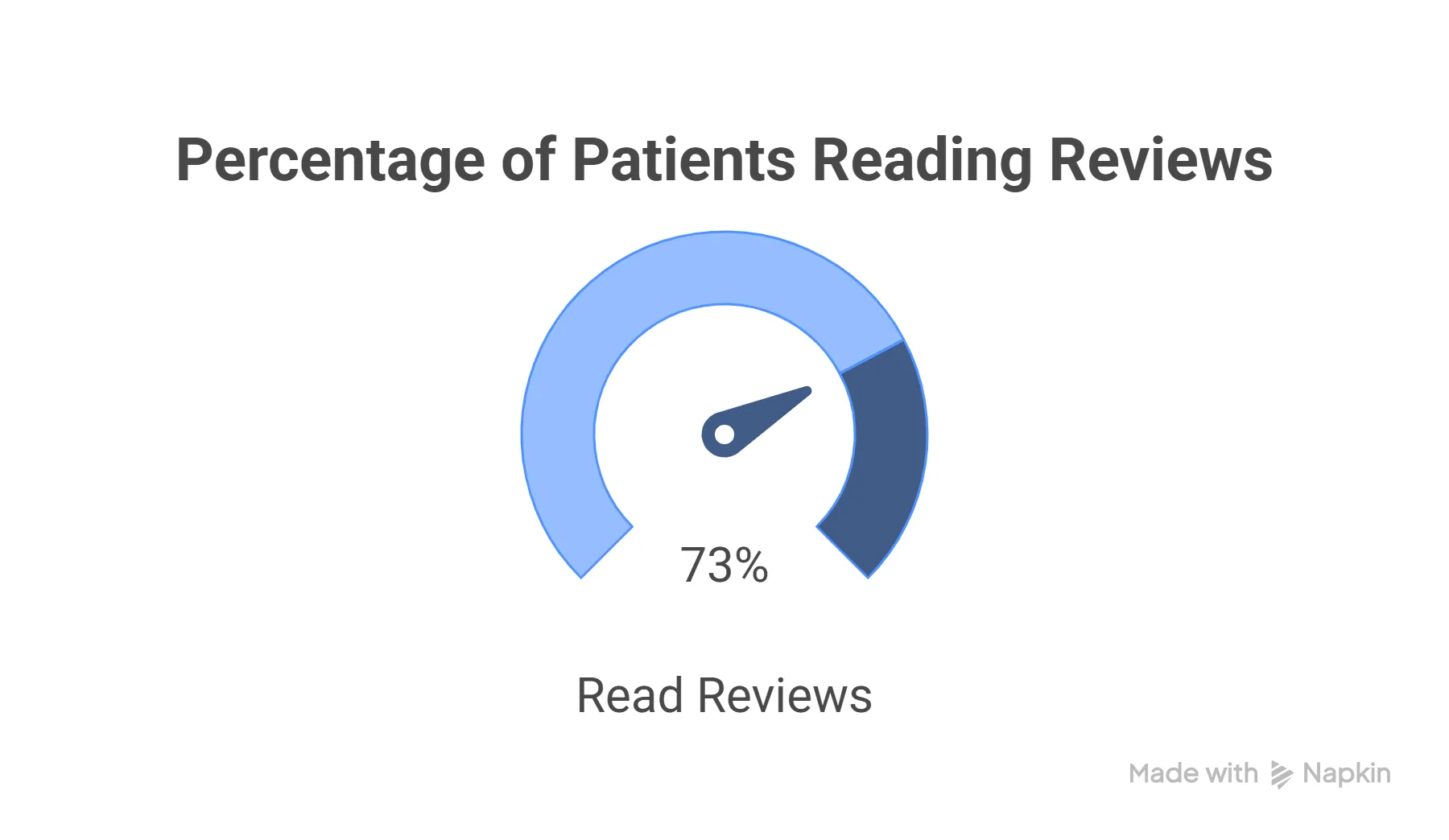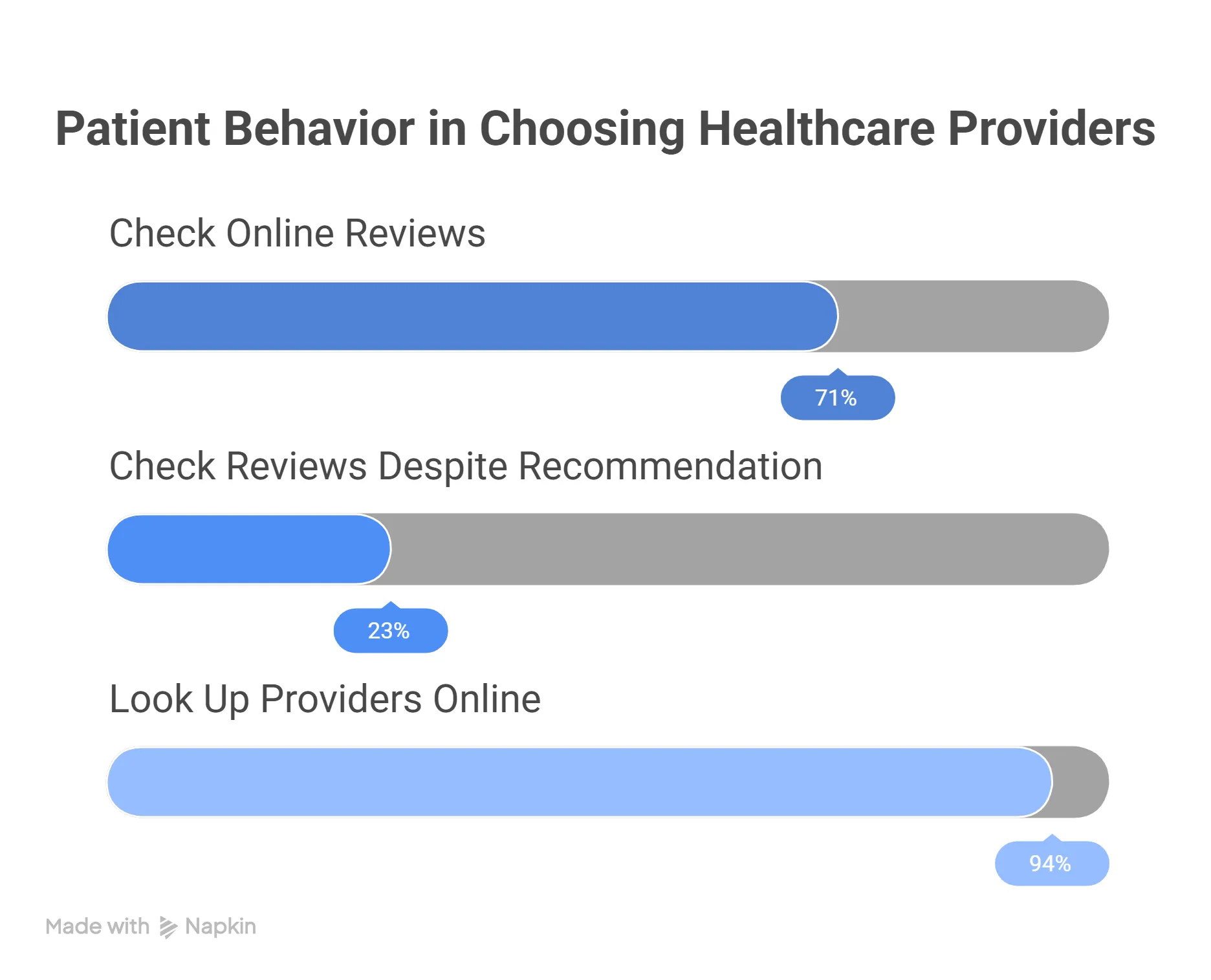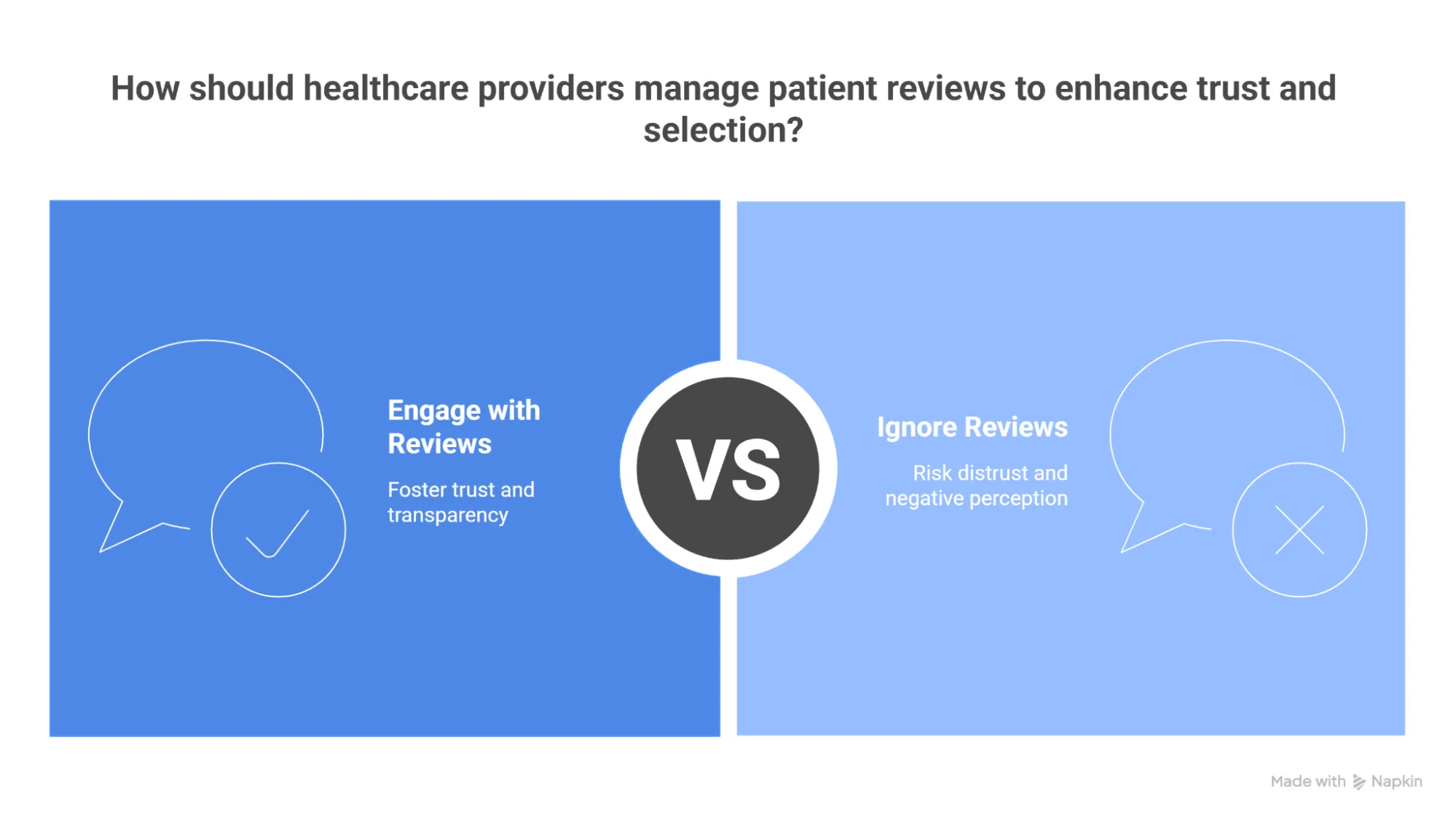Tap play to enjoy this article, and don’t forget to subscribe to RepuGen on Spotify for more insightful podcasts!
Your online reviews play a crucial role in prospective patients' decisions to choose you as their physician. Today, your online reputation is evident; 73% of patients read reviews before making their choice.
That’s why it’s essential to manage your reputation actively, ensuring it reflects the real quality of care you deliver, not just the views of a small group of unhappy patients.
In This Article:
- Patients Have a Choice
- Why Patient Perception Matters
- Review Sites That Patients Trust and Visit
- Google Business Profile
- WebMD
- Healthgrades
- RateMDs
- Yelp
- Zocdoc
- Vitals
- Doctor.com
- Asking Patients to Leave Reviews
- 12 Simple but Effective Ways to Encourage Reviews
- Why You Should Manage Reviews
- So What Does This Mean?
- Achieving Constructive Online Reviews
- Achieving Constructive Online Reviews with AI
- Sentiment Analysis - CommentWiz
- ReplyWize
- Reviews, If Not Managed, Can Hurt Patient Acquisition Efforts
- Reviews, If Not Managed, Can Prevent Patients from Making the Best Choice
- The Way Forward
Patients Have a Choice
Today's patients have more options than ever when it comes to selecting a healthcare provider. Thanks to easy online access to information and reviews, they can research, compare, and narrow down their choices with just a few clicks.
That means you might not even make their shortlist if your online presence doesn't measure up. Patients increasingly use online reviews to see what others say about a hospital or doctor. From your perspective, these reviews may not always accurately reflect your practice, especially if you don't actively manage them.
According to a 2020 survey by Software Advice
online reviews to find a new provider.
In total, 94% of patients look you up online and review your profiles on various sites before making a decision. These numbers underscore the importance of establishing a strong, positive, and robust online presence.
Many healthcare providers feel frustrated or distrustful about review sites because negative feedback can dominate. It's true: unhappy patients are often the most motivated to leave reviews. Unfortunately, those few reviews may be the only ones prospective patients see, causing them to look elsewhere for care.
Why Patient Perception Matters
Patient perception plays a crucial role in their selection of a healthcare provider. Research consistently shows that patients feel most engaged when they are treated with respect and courtesy.
Patients appreciate when physicians show genuine concern for their health, take time to answer all their questions, and create a welcoming environment. They also note courteous behavior by nurses and other staff members as a key part of their experience. With proper staff training and a thoughtful process in place, delivering this level of care is very achievable.
Importantly, prospective patients form their perception of you based on your online reviews.
The 2025 Patient Review Survey shows that negative reviews don't hurt you nearly as much if you respond to them professionally. 59.48% of patients are more likely to choose a provider who responds to both positive and negative reviews.
That's why responding politely and within HIPAA guidelines to online reviews is such a powerful trust-building strategy.
Review Sites That Patients Trust and Visit
One of the most effective ways to strengthen your reputation is to ensure your practice is listed on trusted doctor review sites. These sites attract millions of visitors each month, providing you with significant visibility and access to new patient leads.
Below are 9 top doctor review sites you should consider:

1. Google Business Profile
Create a free, detailed listing that includes your location, service hours, contact information, and reviews. Most patients begin their search on Google.

2. WebMD
A highly trusted health information platform with millions of monthly visitors, featuring a doctor directory where patients rate providers.

3. Healthgrades
Features a searchable database of hospitals, dentists, and doctor profiles with millions of monthly visitors.

4. RateMDs
Enables patients to search for physicians by name, location, specialty, and gender, and read reviews from other patients.

5. Yelp
While associated with restaurants, Yelp also allows users to rate local hospitals and clinics, driving meaningful foot traffic.

6. Facebook
Many patients use Facebook to search for local clinics. A well-maintained page with positive reviews helps engage current and attract new patients.

7. Zocdoc
A paid service offering online and mobile appointment booking where patients can search by provider, location, specialty, reviews, and insurance.

8. Vitals
With more than a million monthly visitors, offers detailed search filters including patient reviews and insurance accepted.

9. Doctor.com
Allows patients to search for providers by name, location, specialty, years of experience, and gender with enhanced profiles.
Potential patients often verify your credibility on multiple directories such as the ones mentioned above. Platforms like ScoreDoc aggregate ratings from multiple review sites, giving patients a well-rounded picture of your reputation. It gives you the option to claim your listed profile too.
Maintaining positive listings and reviews across these platforms boosts both your visibility and the trust patients place in you.
Asking Patients to Leave Reviews
Our experience managing the online reputation of over 1,000 physicians reveals a consistent pattern: most providers deliver high levels of patient satisfaction, but their online reviews often fail to reflect it.
Why? Because the unhappy minority is far more likely to leave reviews. Without a structured process to encourage your satisfied patients to share their experiences, your online reputation can become unbalanced and misleading.
Consider these eye-opening statistics:
Studies also show that unhappy patients tell at least 9 (or more) people about a bad experience, while happy patients share their positive experience with no more than five.
Your reputation is made or broken online.
While you can't stop unhappy patients from venting on every platform they can find, you can make it easier for your happy patients to share their genuine experiences.
This is where reputation management software comes in. By simplifying the process of writing and posting reviews, you can capture a more accurate and balanced picture of your practice’s real quality of care.
When you ask patients for feedback shortly after their visit, they feel valued and involved, which increases their likelihood of leaving a positive review.
12 Simple but Effective Ways to Encourage Reviews
- Ask them directly and in person.
- Link to review sites from your website.
- Use old-school methods like printed reminders.
- Send personalized email requests.
- Automate the patient feedback process.
- Mail physical reminders (snail mail).
- Make a thank-you video with a clear CTA.
- Ask for reviews on social media.
- Make a follow-up phone call.
- Offer small incentives or encouragement.
- Make review requests a standard part of your routine.
- Use healthcare reputation management software like RepuGen to streamline the process.
Online reviews are now a critical factor for both patients and healthcare providers. However, these online reviews often fail to accurately reflect true patient satisfaction, as dissatisfied patients are typically far more likely to leave reviews than those who are happy with their care.
Why You Should Manage Reviews
- Actively managing your online reputation ensures your reviews reflect input from all patients, not just those motivated by frustration.
- When your online reviews more accurately reflect your actual patient satisfaction levels, prospective patients can make a more informed choice.
- To demonstrate the power of review management, we analyzed data from our clients who began using RepuGen.
- After adopting the software, these providers experienced significant increases in both the total number of reviews and the average star rating, while their actual satisfaction levels remained consistent.
- In other words, the software didn't change the quality of care; it simply ensured their online reputation accurately portrayed it.
RepuGen Performance Metrics Across Specialties
| Specialty | Total Providers | Total Reviews (Before RepuGen) | Total Reviews (After RepuGen) | Absolute Change in Reviews | % Growth in Review Volume | Avg. Star Rating (Before RepuGen) | Avg. Star Rating (After RepuGen) | Change in Avg. Rating |
|---|---|---|---|---|---|---|---|---|
| Cardiology | 25 | 59 | 6,717 | +6,658 | 11,284.7% | 3.87 | 4.30 | +0.43 |
| Dentistry | 10 | 667 | 3,722 | +3,055 | 458.0% | 4.23 | 4.33 | +0.10 |
| Dermatology | 179 | 29,368 | 53,865 | +24,497 | 83.4% | 4.37 | 4.62 | +0.25 |
| Neurology | 46 | 2,848 | 5,570 | +2,722 | 95.6% | 4.50 | 4.67 | +0.17 |
| Oncology | 123 | 2,507 | 4,010 | +1,503 | 60.0% | 4.20 | 4.60 | +0.40 |
| Orthopaedics | 45 | 16,501 | 23,570 | +7,069 | 42.8% | 4.50 | 4.78 | +0.28 |
| Pediatrics | 82 | 1,025 | 5,969 | +4,944 | 482.3% | 4.00 | 4.40 | +0.40 |
| Primary Care | 416 | 4,483 | 53,261 | +48,778 | 1,088.1% | 4.06 | 4.41 | +0.35 |
| Urgent Care | 42 | 736 | 7,507 | +6,771 | 920.0% | 4.58 | 4.68 | +0.10 |
| Overall (All Specialties) | 968 | 58,194 | 164,191 | +105,997 | 182.1% | 4.26 | 4.53 | +0.27 |
So What Does This Mean?
Managing your online reputation doesn't change your actual care; it reveals it more accurately to the world. When prospective patients see a trustworthy and balanced picture of your practice, they can make more informed decisions, and you can grow your patient base with confidence.
Achieving Constructive Online Reviews
Healthcare providers should make it a priority to:
- Monitor online reviews and compare them to internal patient satisfaction data.
- Actively solicit feedback and reviews through automated surveys.
This approach ensures your online reputation aligns with the real quality of care you deliver.
Contact RepuGen to learn how you can take these steps effectively and sustainably.
Achieving Constructive Online Reviews with AI
Proactive reputation management goes beyond collecting reviews; it's about understanding and responding to them.
RepuGen's AI-driven solutions help you do this with ease:
Sentiment Analysis - CommentWiz
This advanced tool helps you quickly grasp the themes and emotions in patient feedback.
- Analyze sentiment in reviews.
- Visualize insights with word clouds.
- Identify key trends.
- Fully HIPAA-compliant to protect patient privacy.
ReplyWize
ReplyWize makes it easy to craft thoughtful, empathetic, and professional responses to reviews.
- Generates tailored replies automatically.
- Maintains consistent communication.
- Ensures HIPAA compliance.
By utilizing these tools, you can transform reviews into a strategic asset, fostering deeper trust and continually enhancing your patient experience.
Reviews, If Not Managed, Can Hurt Patient Acquisition Efforts
Patients trust online reviews more than recommendations from friends or family.
If your reviews don't reflect your true quality of care, you could lose patients to competitors with better online reputations, even if their care is objectively worse.
Reviews, If Not Managed, Can Prevent Patients from Making the Best Choice
When online reviews don't match the actual level of care you deliver, patients can't make an informed decision. That's bad for them, and bad for you.
Healthcare providers must also respond publicly to reviews, both to thank patients and address any concerns they may have.
Doing this professionally and within HIPAA guidelines demonstrates to prospective patients that you value feedback and take quality seriously.
The Way Forward
The modern healthcare environment demands proactive online reputation management. Providers should:
- Continuously monitor and evaluate patient reviews.
- Benchmark them against internal satisfaction data.
- Implement automated survey systems to gather feedback on a regular basis.
RepuGen offers a secure, HIPAA-compliant solution to help you do this easily and effectively.
Consider the lifetime value of your patients. One loyal patient can represent decades of care. Retaining their trust and loyalty is critical to the long-term success of your practice.
RepuGen is designed to help you achieve this at a competitive cost, ensuring your online reputation supports patient trust, acquisition, and retention.





